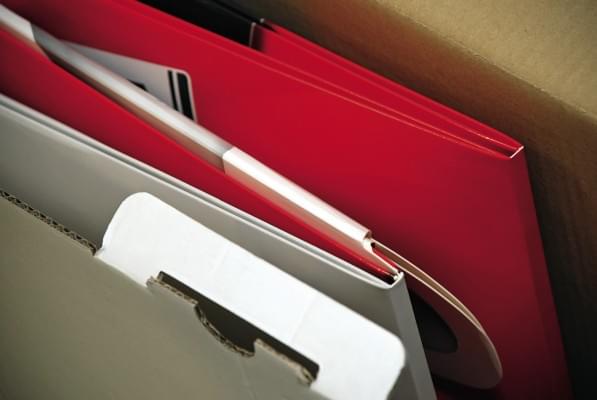Trends in paper packaging / We have entered the age of reduction
The overall economic situation always has strong influence on the most important packaging material segment. Thanks to the recently commenced GDP growth in Hungary and the positive international economic climate, the domestic paper packaging production is growing above the European average.
Production is primarily expanding because of export sales, but the domestic market is also in the positive. Corrugated board products are the most popular. György Kolozsvári, sales director of STI Petőfi Printing House Kft. told our magazine that volume sales are definitely growing but value sales are increasing slower. Partners demand more and more at ever-lower prices. Managing director Tibor Vaszkó, the technical director of Green Packaging Kft. informed Trade magazin that partners don’t simply want packaging material, they want solutions to their problems and look on packaging as a factor that is to be minimised – which obviously also entails cost-cutting. In the FMCG sector the significance of shelf-ready packaging (SRP) is growing. These solutions take weight off retailers’ shoulders: they don’t have to unwrap and repackage, products are easier to identify and place, and in general they make shopping easier. Zsolt Fekete, managing director of DS Smith Packaging Hungary explained to us that these days retail chains demand SRP solutions. Another trend he sees is the growing demand for high-quality printing, plus the share of digital prints is increasing, too. Jenő Kampós, key account director of Tetra Pak Hungária Zrt. told our magazine that people’s lifestyles had changed in the last few years and this influenced their product choice too. Demand increased for products consumed ‘on-the-go’: for instance packaging that is easy to open, resealable and easy to hold in the hand became a standard expectation. Iván Katona, sales manager with Sz. Variáns Kft. added that with premium packaging materials it also became important to manufacture solutions which are durable, so that the products can be stored in them for years. Logistics demands also changed a lot in recent years, partners want short delivery periods and to be served with products already in stock, so that they can react to market changes rapidly. Many partners require complex solutions: packaging, counselling and design ideas, too. Just-In-Time and Just-In-Sequence warehouse logistics solutions support partners’ lean approach in production. One-piece-flow solutions are also more and more frequently used in manufacturing. In today’s market environment innovation doesn’t only mean product innovation but also the constant developing of complex solutions, technologies and processes. According to Mária Sigray, managing director of Rondo Corrugated Board Kft. only by using state-of-the-art machinery and the latest technology can companies stay competitive. For instance this year Rondo made its product flow system fully automatic. Tetra Pak senses growing demand for innovative packaging solutions in Central Europe too. They keep expanding their portfolio to meet changing demand and offer cost-efficient solutions. The experts agreed that traceability and food safety are also fundamental elements of market success. Demand is also increasing for smaller packaging solutions, which are cheaper to transport, but Green Packaging also manufactured take-away boxes for fast food restaurant use that can be closed in 2 seconds, which is great help in peak periods. Corrugated boards are 100-perecnt recyclable and their degradation period is short. Still, it is mainly major manufacturers that pay special attention to be environmentally conscious. STI Petőfi already won the ‘Green printing house of the year’ award many times and is a partner in many sustainability and environmental protection projects. The problem is that green packaging solutions are more expensive and the average purchasing manager in Hungary opts for the cheaper packaging solution. It is good news that data collected by the Drink Carton Environmental Association (IKSZ) show that the selective collection and recycling of drink cartons keeps growing. Responsible forest management is becoming more and more important in the packaging industry. Finnish Metsä Group is one of the world’s biggest forest industry groups and their packaging business, Metsä Board only uses wood coming from sustainably managed forests. Hedvig Mattyasovszky, the head of the company’s Hungarian office told us that their carton and liner quality products are made exclusively from fresh pulp and meet the strictest quality and safety requirements. A few years ago Metsä Board launched a programme to reduce packaging weight: in the case of many products they managed to cut weight by 20 percent. These cartons have the same excellent characteristics as before, but using them doesn’t only mean lower costs but also protecting the environment – they are cheaper to transport and at the end of their life cycle they constitute less waste
Related news
Related news
The economic sentiment index deteriorated in the euro area and the EU in February, but improved in Hungary
🎧 Hallgasd a cikket: Lejátszás Szünet Folytatás Leállítás Nyelv: Auto…
Read more >Zsófia Bánhegyi is the marketing, communications and public relations director of HUN-REN
🎧 Hallgasd a cikket: Lejátszás Szünet Folytatás Leállítás Nyelv: Auto…
Read more >





